Article publié par Alexia Debeaux, Senior Architect chez Keyrus Management Pour en savoir + sur Keyrus Management, rendez-vous sur ce lien.

What is a Data-Driven Business?
Data is an enterprise’s most strategic asset, if valorized appropriately. Data is the representation of your environment; it can be information about your customers, about your competitors or about your suppliers. Through Data you can gain perspective on the market your enterprise evolves in. A Data-Driven Business consists in relying on Data to conduct business, to make strategic or operational decisions. However this approach requires your Data to be of proper quality, organized, easily accessible and valorized to its full potential.
Why is it a binding strategy for enterprises?
Enterprises are becoming more and more digitalized and connected, generating an increasing amount of Data. New technologies also go in the same direction with components such as connected objects or APIs allowing facilitated external Data collection. A Data-Driven Business approach is now mandatory for any enterprise wishing to grasp a better understanding of their customers and the overall context in which they are evolving. Enterprises mastering their Data are more likely to move ahead of their competitors and develop innovative services.
How to develop a Data-Driven Business approach?

In order to build a successful Data-Driven Business approach, is it essential to take into account all business stakes, may they be linked to the overall enterprise strategy or those concerning business activities. Through an in-depth mapping of the strategic and business stakes, a first overview of the IT capabilities will start to emerge. These capabilities will be needed to build the target architecture as well as the associated base frame principles and rules. The target architecture will emphasize the skills and profiles required to meet the target organization. In addition, new delivery methods can also be setup to meet the overall target.
Stakeholders will buy-in quick-wins that will be identified through a project portfolio. For example through a Data Warehouse, Data Lake or Data Lab it will be possible to combine Data originating from several sources and find new and innovative use cases resulting in a quick return on investment. The goal is to implement these quick-wins in an iterative manner with business teams as the main stakeholders. These quick-wins are typical examples of visible Data valorization.
What are the key domains of a Data-Driven Business approach?
A Data-Driven Business approach involves several key domains:
Master Data Management
: Master Data is critical in an organization due to its high transversality and usability rate. It is therefore necessary to reflect on the master Data architecture design to ensure it is properly streamlined and coherent with business stakes.
Data Catalog
: The Data Catalog ensures that one piece of Data has the same meaning throughout the organization. It is the first step to take to reach a complete view of your enterprise’s Data. All business teams should be involved as this approach will help dispersed teams to collaborate on Data set quality, usage, and business descriptions.
Data Governance Rules and Workflows:
The Data life cycle from collecting raw Data to proposing elaborate and relevant dashboards needs to be designed and supervised in order to ensure both traceability and consistency. Data must flow freely throughout the Information Systems without performance degradation or quality loss.
Compliance and Documentation
: With the GDPR advent, Data compliance has taken on a new turn. Enterprises now need to comply with this new regulation willing to ensure Data protection and privacy for all individuals within the European Union in addition to other specific regulations from specific business fields (i.e. BCBS 239 for financial reports). Of course, compliance is easier when IS documentation is kept up to date and shared within the organization.
Integration Architecture
: With the constant evolution of new technologies, an enterprise’s architecture needs to be more flexible and adaptable than ever to integrate new components, new sources of Data or new algorithms. A reactive integration architecture accelerates Data integration and is foundation to keeping at good pace a competitive release map.
Organizational Governance
: Data Governance cannot be sustained without the on-boarding of employees in your enterprise. Business and IT roles for Data governance are specific and must be clearly defined in order to engage people from both sides in a constructive relationship.
Data Quality
: Data Quality is the first condition to Data valorization. Before applying any advanced algorithm to your Data, quality is key. A first evaluation of the overall quality level followed by a thorough diagnosis will need to be carried out. Corrective measure can then take plan followed by an action plan.
An Example of Customer Data Valorization
Let us consider the following context: an enterprise wishes to develop its e-commerce sales. In order to do so, it has several tactics at its disposal, one of them being the conversion rate of visitors on its e-commerce website. This tactic includes, among other levers, the conversion of abandoned shopping carts. In order to avoid abandoned carts, we need to anticipate such prospect behavior and react accordingly, prior to the abandon.
Now that the business need is clearly identified, it is time to address the Data problem behind it. Data scientists will work on a predictive model based on, for instance, navigational Data from the e-commerce website which can be found in a Data Lake for example. The key point here is to thoroughly translate this business problematic into a mathematical model which will allow us to deduce the probability of a prospect leaving its shopping cart.
Now, as we have previously seen, not all of the Data is worth looking into, hence the clusterisation step in order to prioritize potential targets. Once the proper cluster has been decided, let us say a high basket amount correlated with a high probability of leaving the site, a preventive action can be triggered. In real-time, an alert will be pushed to the offer and loyalty tool which will, in turn, determine which sales action is more suited for the client (free shipping, promotion, simple reminder…).
Conclusion
A Data-Driven Business approach enables enterprises to gather insightful information and activate operational leverages in order to fulfill their strategic vision. This requires a complete on-boarding of the organization, both IT and business, and a strong sponsorship from the executive committee.